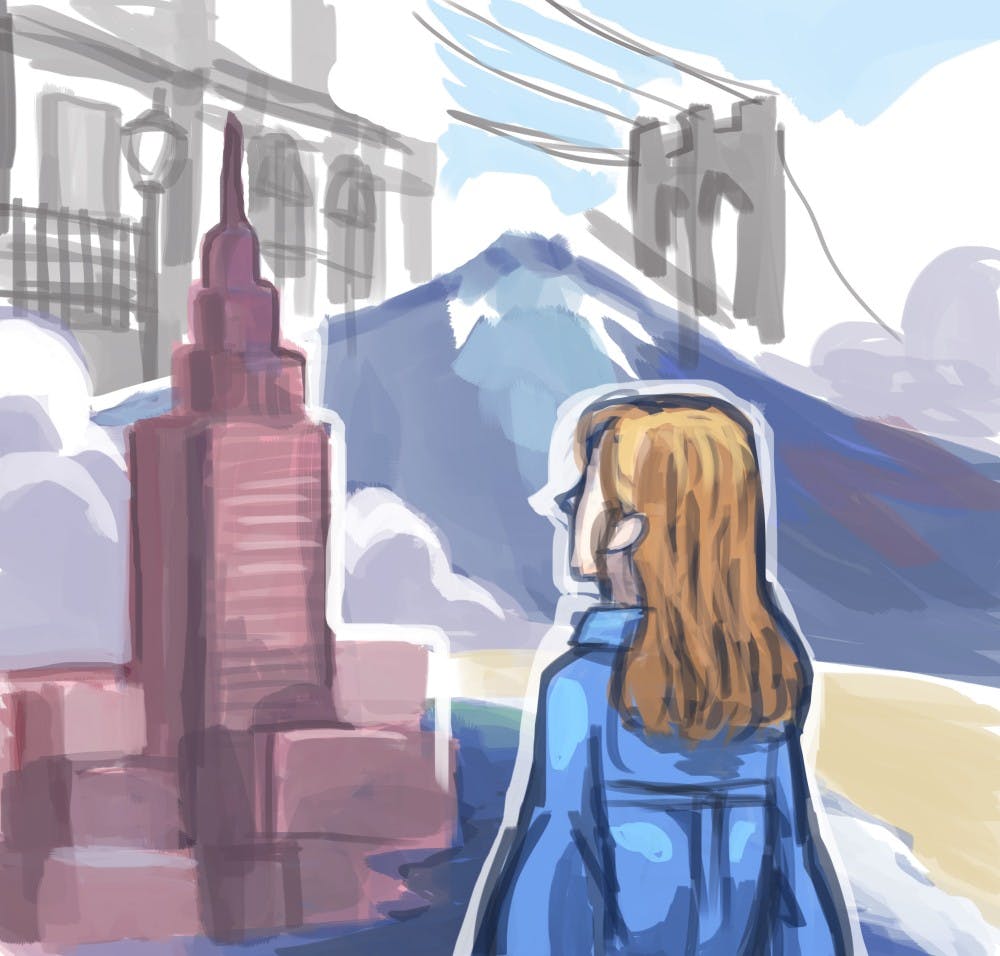Signing up for my first poetry class last spring, I thought I'd spend the semester making conceptual pieces: deleting words to leave teeming silences, or cutting out halves of sentences. I expected geometries like gridded streets, motions like linear migrations. What I got were the numbered and alphabetized streets of my own neighborhood, and an infinite stretching outwards. I wrote about woven fire escapes and puttering engines.
All of this came, unexpectedly but unsurprisingly, from a refusal to let go. I still felt the pull of curbs and skids and rushes of air, and they became mine even though I fought them. In my poems were places I hadn't put into writing before, and a new love that took the form of distance.
Arriving in NYC after months away at Penn, I’d often forget the largeness of my city and the reach of its skyline. The main shopping street of my neighborhood—where grocery stores spill over to the edge of the sidewalk and light pulses from the slits of the subway platform overhead—seemed too loud and hectic. Storefronts had made way for new storefronts, but my business there had changed, too.
Freshman year, bits of interactions made skyscrapers of molehills. There was the surprise of my professors at the fact that I speak Russian. There was the frequency with which I met classmates who had multiple family connections to Penn. And, there was my inability to align with the Jewish geography of most Hillel–goers.
There came a point when I stopped saying I was from New York and started saying I was from Brooklyn—and not Williamsburg Brooklyn, as I often had to explain to Manhattan natives, but immigrant Brooklyn. I still had a sense of ownership of my particular piece of NY.
I was used to being tripped up by cracked concrete where the roots were strongest. I missed the awnings with flaking paint like shedding skin, and people hauling carts full of things I couldn't pronounce. Home consisted of throbs of people who like their corner store bargains, people who know what it is to have nothing. In a sense, that’s what brought them together.
I'd left behind the ceremonies of mixing sour cream into borscht to make it less bitter, and of translating CVS coupons to my grandma. Home was something that needed me as much as I needed it. It could be frustrating, dissatisfying, and unrefined, lined with languishing oak limbs and backed–up street drains, but it was mine.
After a year of back and forth from New York to Philly, I had the packing and travel down to a science. Then, in May, I brought out boots and sweaters for what would be my first solo international experience—two months of interning in Buenos Aires. With a limited time in a country 11 hours away, I was determined to make it purposeful. Famous cafes, neighborhood strolls, and weekend trips were all planned for.
Between jutting tiles and too–small subway cars, Argentinians pack in passion and pride. And in this much–too–close environment, I accepted a new openness to the inevitability of bumping into people and to crossing long avenues at strange points. I'd peeled myself off the only continent I'd known, left my Star of David necklace in NY per my mom's request, and stuck myself to the unfamiliar.
After most walks had been taken and milanesas devoured, a sighting from the top of a staircase and an unsolicited set–up by a mutual friend led to the most foreign of my experiences away from home. What transpired felt too smooth to be reality, but too honest to be a dreamy rom–com. He was a man of the real world, of rampant inflation and the ambition to move beyond Argentinian instability—but it was a different world.
There we were, drawn to perfectly ordinary things that appeared exotic, each one speaking in a language that hadn't always been our own. When we brought up where we came from, it was like starting from scratch. We talked about how leaving made it easier to continue to leave. We didn't know how we'd ended up sharing the same space on a couch with too little room for two, but it was just the start. When it came time to try to process my experience abroad before I left, it was difficult to separate the city from the people who'd given it its accents.
Navigating shifting detours, I tried to speak a Spanish that lacked the inflections of English or Russian, though both inevitably peeked out at times. I grew attached to a collection, at the city's museum of Latin American art, that represented cities in the Americas as lived experiences. Rooms were clustered with art that suggested cities as dreamed, as abstract, and as marginalizing. They were all murky, intangible bodies. They spun together well–established citizens and hopeful immigrants and temporary visitors, and they were always growing new limbs.
I realized that when I left home, I did it too soon—before my family could reach agreements about movie nights, before I could let my grandparents feed me the soups I've always known. And I realized that too soon is the best way to leave a place—while you’re still enthralled, while you still feel the pull of things done and undone. Home is anywhere you can come to love the same things over and over again.
“You’re not really leaving, because you’ve left a part of yourself in Buenos Aires,” he said. “The wind never blows from the same direction.” In our exchange, there was respect for boundaries and disregard of borders. And discovering new feelings through new encounters was its own kind of tourism; “this is just the beginning,” he said. “It’ll be okay.” And it was.
Rachel is a sophomore in Wharton, studying Actuarial Science and Finance. She plans to minor in Creative Writing.







